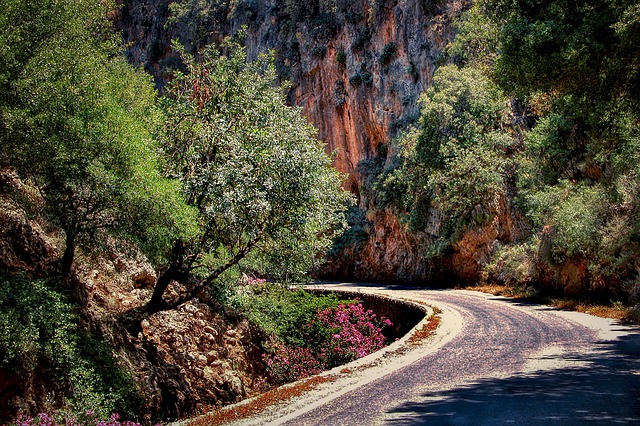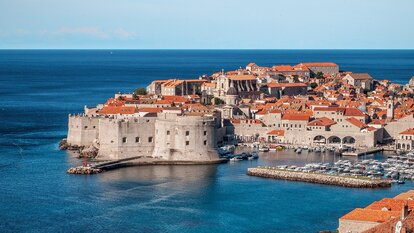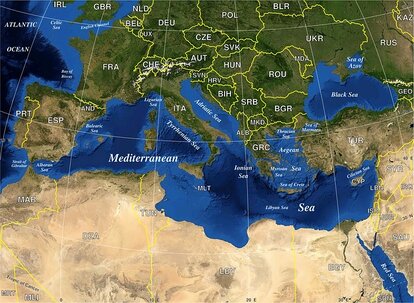Earth Day
Challenges on the Mediterranean coast

The word "Mediterranean" is a word that reflects its origin as the "centre of the earth"; the scene and witness of different cultures such as the Romans, Greeks, Phoenicians, Carthaginians, Byzantines, as well as an enclave where trade developed and flourished. Nowadays, it is one of the main tourist areas in the world. Sustainability plays an important role, due to the diversity of ecosystems it hosts, and the provision and use of its natural resources, investment in clean energy and the reduction of polluting emissions, as well as variables related to equity, justice and the distribution of wealth, among others. The economies of the Mediterranean coastal countries, currently 21 in total*, account for approximately 10% of the world's Gross Domestic Product (GDP). It is apparently a prosperous and wealthy area, but in reality it is home to numerous inequalities. There are highly advanced economies such as France, Italy and Spain, with GDP per capita of over €30,000 per year, and economies such as Albania, Egypt, Lebanon and Morocco, which barely reach €4,000, or the war-torn economy of Syria, where the figure is less than €1,000. It is noteworthy that the poorer countries have less democratic or developed political models than the richer ones, and this is evident in different areas, such as, for example, the school enrolment rate, with France and Italy exceeding 99%, and Morocco and Syria barely having three out of four children in school. The same is true for the percentage of households with internet access: at least three out of four households have access in France, Spain and Israel, but Morocco and Syria have less than one in four. These same countries occupy the best and worst positions in the United Nations Human Development Index. All this translates into fewer opportunities and greater inequality.
In order to reduce the gap between the countries on the European coast and those on the African-Asian coast, it is necessary to strengthen civil rights, justice and private property in order to promote greater equality of opportunities, a more educated population and greater entrepreneurial activity. For this reason, the role of governments and justice is decisive in achieving sustainable development in all countries. While in Spain, France or Italy, the judicial system is slow, in Turkey, Morocco, Tunisia or Egypt the judicial system is subject to political interference and lack of independence, which raises doubts about its impartiality and effectiveness. Albania, Bosnia and Herzegovina, Montenegro or Kosovo are undertaking judicial reforms with the aim of improving their independence and efficiency.

Dubrovnik
© PixabayAll these countries have tax systems that tax personal income, corporate income and consumption. The exception is Monaco, where hardly any taxes are paid. The fight against fraud should be common to almost all these countries, which also have a vast underground economy, which is difficult to calculate and which is estimated to range from 10% in France to over 40% in Tunisia. The organisation Transparency International has developed a corruption perception index, which is an endemic problem in all these countries, especially Egypt, which is ranked 140th out of the 180 countries studied. Corruption is a brake on individual freedom and the development of prosperous economies, which must be combated in a coordinated and energetic manner.
The level of indebtedness also appears as a brake on certain countries, such as Greece, with a debt of more than 200% of GDP. Italy, Portugal, Spain and France are also highly indebted.
As for the free movement of goods, services and capital, in some countries, such as Morocco and Egypt, there are certain restrictions on the outflow of capital. All of them, according to World Bank statistics, have high levels of openness to foreign trade. Countries with a European coastline trade among themselves and with the UK and the US. African-Asian coastal countries generally trade with European countries, the US and China. The latter countries import machinery, chemicals and foodstuffs and export mainly energy. Tourism is the main industry, whose contribution varies from country to country, reaching 14% in Spain, Italy and Tunisia.
Health is another key factor in which investment is needed. Greece has six doctors per 1,000 inhabitants, Spain has four, Turkey, which is a developing country, has barely two, and Egypt and Morocco have less than one. Life expectancy in Spain is close to 84 years, while in Turkey it is barely 77 years, and in Libya 73 years. The countries on the African-Asian coast of the Mediterranean need to invest in training medical personnel and in more hospitals.

Mediterranean region
© PixabayGreater access to education also leads to better use of resources. In Italy, Greece, Croatia, France and Spain, clean energies have been developed, in the case of France there is also a very high percentage of nuclear energy. The countries of the African Mediterranean coast, on the other hand, are more dependent on fossil fuels. However, some countries, such as Morocco, are investing heavily in the development of renewable energies. This should be the way forward for other countries.
In terms of social and civil rights, women's participation is also unequal. While in France, Spain and Italy, efforts are being made to reduce the wage gap and to achieve a more equal distribution of decision-making bodies, in other countries such as Algeria, Libya, Lebanon and Morocco, women suffer strong discrimination and domestic violence, and barely 20% of them come to work outside the home. In Egypt, Greece, Turkey and Morocco they barely represent twenty percent of the parliament. Women legally have rights, but do not actively participate in work, society or political power in many of these countries, usually the poorest. Progress must be made to increase women's participation in society and in governing bodies. In this way the countries will gain in rights and freedoms and become more prosperous.
All countries are investing heavily in infrastructure, although not continuously. For example, Algeria has an extensive road and rail network, which has been affected by reduced investment in recent years. While Morocco is building high-speed roads, modern ports such as Nador West Med, and a renovated railway system.
The less advanced economies on the Mediterranean coast have a high development potential, which should be tapped by the ruling elites of these countries, with the support of Europe, to achieve a path of transformation and development with stronger institutions and services to citizens, enabling access to education for a greater proportion of individuals, investing in health systems, and developing laws that protect citizens and businesses, as has happened in Southeast Asian and Latin American countries.
